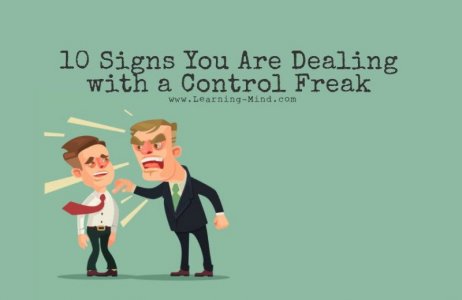More research on control freaks, (I may have referenced this site before?):
https://www.psychologytoday.com/gb/blog/insight-is-2020/201604/5-signs-you-are-dealing-control-freak
Quote:
"
1. Correcting people when they're wrong
People with a high need for control often feel the need to correct others when they're wrong. They correct someone due to an irrational argument; they correct spelling or pronunciation; they correct details of what happened in the past; they correct bad manners; they correct people when they do something wrong or inappropriate. It's important to understand, though, that underneath the motivation to correct others is the belief that they are usually—or always—right.
2. Always trying to win the argument or have the last word
High-control men and women are difficult to have relationships with because they like to set the rules—and subsequently enforce them. They act superior to others and are determined to show everyone that they are the most practical, logical, and intelligent person in any crowd.
3. Refusal to admit when they're wrong
Hands down, one of the traits that most annoys friends, romantic partners, and colleagues is the refusal on the part of high-control men and women to admit when they are wrong. It could be the smallest, simplest issue, but high-control people don't care—they just want to make sure they don't admit they were wrong. Their thinking is distorted to the point that they believe others may use their admission against them or will perceive them as incompetent or foolish because of one simple error. As a rule, these individuals present all-or-nothing, black-or-white thinking; dealing with anything in between is uncomfortable for them.
4. Judging or criticizing others
Some of the most judgmental individuals you will ever meet are men and women with a high need for control. They are highly principled, with opinions on everything from how people should hold their fork to how people should live their entire lives. These men and women have an answer for everything, and they come across as sanctimonious or hypocritical to those who know them well.
5. Driving with rage
People with a high need for control often get very frustrated while driving. They believe they are the only ones who know how to drive correctly. They often put other drivers down, make nasty faces at them, or even curse or issue profanities when someone on the road does something that bothers them. Yet the most common problem with high-control men and women on the road is their own impatience. They get annoyed because drivers go too slow or too fast. They treat pedestrians as interference getting in the way of accomplishing their goals. Again, in the minds of these individuals, it's all about them and they don't spend time trying to imagine what anyone else thinks or feels in the same situation.
The takeaway
High-control men and women, the people we call "control freaks," engage in a series of behaviors that frustrate others and cause resentment. These individuals operate the way they do because they believe that they need to in order to meet their needs and accomplish their goals. If you see yourself in some of these high-control behaviors, take a step back and ask yourself whether you are exhausted from always trying to control everything. If you see someone you love in these behaviors, it's time to have a chat about what bothers you, so that your resentments don't get worse, jeopardizing the future of the relationship. If you point out to a high-control man or woman that you have a problem with them, give them a few concrete examples of what they do that bothers you—and give them time to work on changing."


